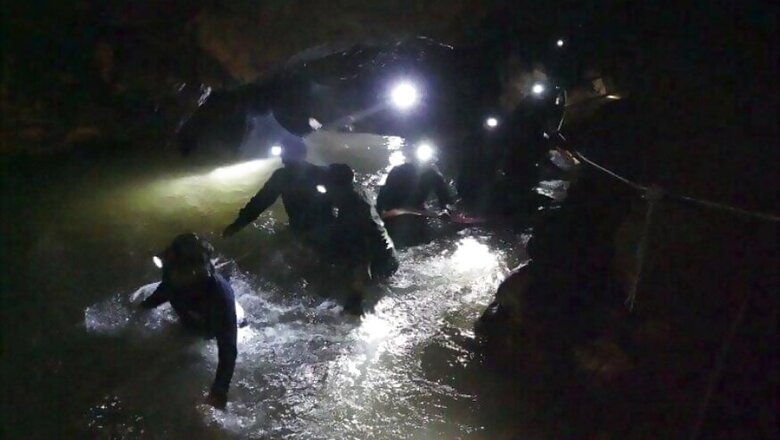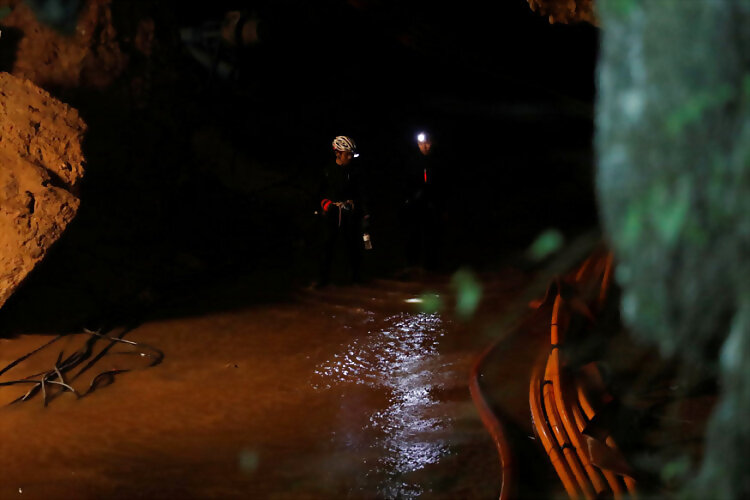
views
Tham Luang Cave, Thailand: As the world holds its breath, 12 boys and their soccer coach - accompanied by an elite team of rescue divers - are making a treacherous journey to safety through flooded underground caverns that have tested some of the world's best cavers.
Four boys have so far completed the hazardous escape, according to rescue officials, and are receiving medical treatment. Efforts to bring the remaining eight boys and their adult coach to the surface will resume on Monday morning.
The boys were each being led by two divers as they wind 4 kilometres (2.5 miles) through pitch darkness, trudge through thick mud, clamber over slippery jagged rocks and dive through narrow passageways swirling with cold, strong currents.
"It's dangerous to the most experienced divers to go through," said one diver who spoke to Reuters. "It's pretty scary."
The cave system, in a limestone mountain range bordering Myanmar in northern Thailand, has proven to be a formidable challenge for the international rescue coalition drawing some of the world's best divers who have volunteered to help in the operation alongside Thai Navy SEALs.
The boys, aged between 11 and 16, went missing with their 25-year-old coach after soccer practice on June 23, setting out on an adventure to explore the cave complex, reportedly for a picnic to celebrate one of their birthdays, before being trapped by rising waters from bursts of monsoon rain.

Dubbed "D-day" by the rescue team leader, the divers entered the wide cave mouth on Sunday morning to begin extracting the boys, accompanied by a whole contingent of emergency workers.
One cave explorer who has been inside the Tham Luang cave complex described it a "labyrinth", adding it was much more difficult to navigate than any other he had experienced.
The first, nearly 1 kilometre (0.6 mile) long section from where the boys have been huddling in darkness is believed to be the most difficult, requiring a long dive and crawling through mud and debris, with some crevices barely wide enough for a person.
"The hole is really small, I have to take off my air tank to crawl through it," a 25-year-old Thai Navy SEAL who declined to be named, told Reuters before the rescue attempt. "As I do, I feel the edges of the hole on both my back and chest."
The British Cave Rescue Council, which has sent seven divers to assist in the rescue, said the death of a former Thai Navy SEAL last Friday as he dived within the cave was a reminder of the risks.
"This demonstrates in stark terms, the dangers associated with the cave environment, especially those characterised by long sections of passage with deep water or those entirely filled with water," the association wrote on its website.
Once past that stretch, the boys' escape route forks east at a T-junction, and they must scrabble over some diverse terrain including giant boulders, sand and slippery rocks with sudden cliff-like drops and further submerged passageways.
An underground operations centre has been set up in the so-called "cavern 3", after which there is a further 2-kilometre journey to reach the mouth of the cave.
The rescue team leader said that, in some of the larger caverns, extensive pumping had reduced water levels so that they were now walkable, even with the onset of fresh monsoon rain on Sunday.
Falling oxygen levels, and with many of the boys not able to swim well, present further risks should they panic as they are guided slowly through the pitch-black waters.
"It's very dark inside even with the spotlight," a former veteran SEAL, who had been recalled for this mission, told Reuters. "Most of the time we work with our instinct, in some position, alone in silence and in the dark."



















Comments
0 comment